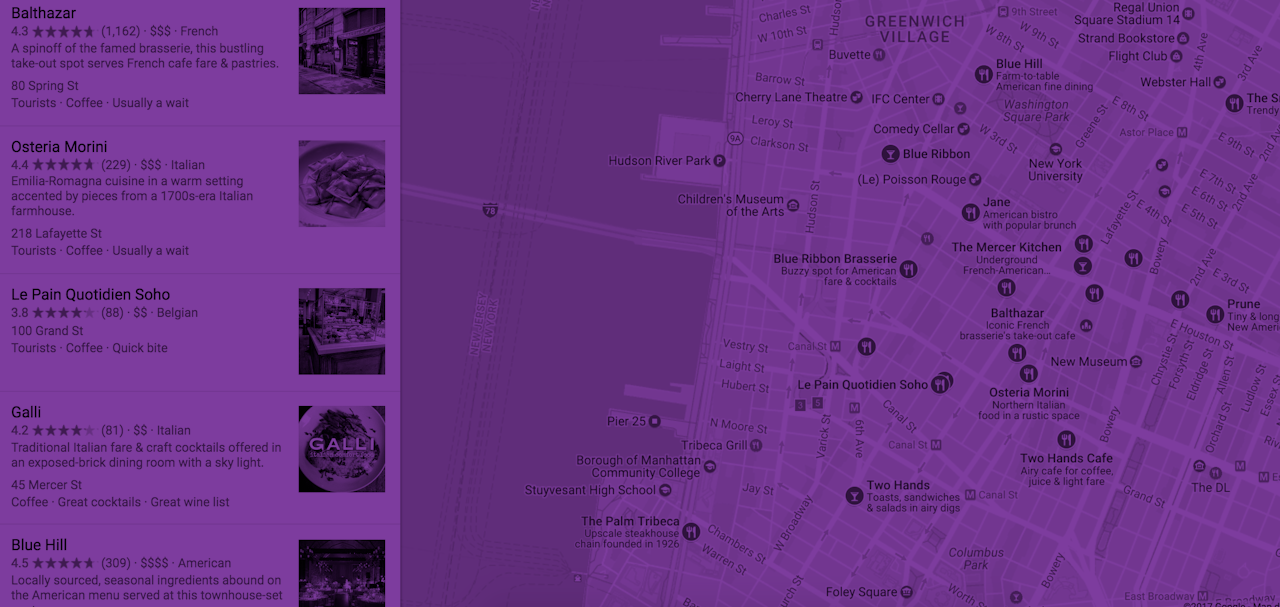Mike Blumenthal, an expert on SEO for local businesses, is one of the hundreds of volunteers Google trusts to answer questions on its customer support forums. That’s how he recently stumbled across what he’s convinced is a network of fake Google accounts leaving positive reviews across dozens of business.
Google reviews are important to local businesses because they influence the way a business looks in Google Search and Google Maps. Unfortunately, it’s shockingly easy to fake a positive review score, Blumenthal said, and these planted reviews often slip under Google’s nose. The search giant is only concerned with widespread “systemic abuse,” he said, which is why this system is so easily gamed.
Someone contacted him about what appeared to be some fake reviews with names ranging from the odd “Wopper M” to the slightly-more-natural “charlz Alexon” attached to them, and Blumenthal started digging. By tracing other reviews for the same businesses, and the way in which various accounts overlap their reviews, Blumenthal began to build a database of over 100 different reviewers that appeared to be part of the same network leaving immensely positive reviews across vast geographic distances.
Blumenthal told The Outline about one particular account he suspected of being fake. “This woman purchased her wedding ring in Israel, eight months later hired a private investigator to track her husband down in the Philippines,” she said. “She had her cell phone fixed by the same franchise on the east and west coasts of Canada. Procured pest control services in two very far away cities, New York City and San Antonio, and then while she was in Austin, TX [...] she had her children’s teeth examined.”
The same reviewer then shipped her car via three separate companies. The lone negative review across all of this? A cigar shop in Brisbane, Australia — possibly an attempt to make the account look more plausible or a commission from a competitor. Most likely, Blumenthal said, it was a business that somehow angered the humans behind the fake reviews.
The consensus between Blumenthal and those commenting on his work so far is that there’s some group out there selling themselves as an SEO or reputation-building agency that will improve the ranking of businesses on Google. The theory goes that this firm probably isn’t telling people its exact methods.
The local recommendations within Google Maps can be super useful. If you’re in an unfamiliar area, you can pop the app open on your phone and take a look around and see what’s good nearby. According to a 2014 study by Google, four out of five of people surveyed conducted searches with “local intent,” meaning that people were searching with the desired outcome being local results, with 88 percent doing so via smartphone. That means a lot of people are likely seeing the high rating of these businesses, the end result of the fake reviews, and assuming that it’s a valid rating. Fake reviews are just good business. Unfortunately, this doesn’t work so well if the reviews are fake.
“We use automated systems to detect for spam and fraud,” a Google spokesperson told The Outline in an email responding to questions about how it finds fake reviews. “But we tend not to share details behind our processes so as not to tip off spammers or others with bad intent.”
Yelp, by contrast, regularly makes it known how vigorous the company is with vetting reviews. The site’s software recommends reviews based on quality, reliability, and user activity. Exactly how it determines whether a review is a fake isn’t clear, but those reviews it doesn’t recommend in this way are not factored into the overall rating of a business, and they’re listed at the bottom of the page underneath those reviews which are recommended. Google’s fake reviews are seemingly scrubbed entirely.
The studio also denied paying for fake reviews
It’s unclear which group — or multiple groups — might be responsible for the fake review network. Of the companies contacted by The Outline which Blumenthal indicated as having fake reviews, only one confirmed the hiring of a third-party SEO firm. A dance studio in New York admitted over the phone that they used a business that helped with SEO, and they went on to alternatingly explain that it was based “overseas” and “somewhere in Europe” and “from Russia” when asked for details. The studio also denied paying for fake reviews, and repeatedly questioned whether that would fall under the purview of SEO at all.
What is clear however is that the reviews were fake: The reviews for every account Blumenthal has provided to Google during the course of his investigation have since been wiped. Perhaps Google will review how it handles fake reviews, as it recently did with its fake search results.
Until that happens, Blumenthal is going to keep digging. He’s even had a programmer develop a tool that’ll allow him to more quickly identify fake reviews by automating much of the process he was doing by hand. “Google took the 100 I gave them down,” he said, “but we don’t know how deep this network goes” beyond that. “They only fixed the ones I reported explicitly, they did nothing to deal with this large network.”

